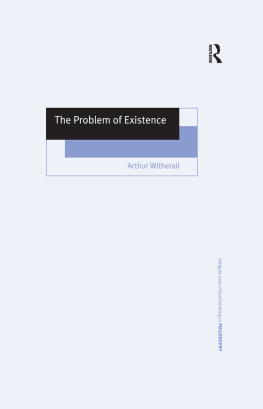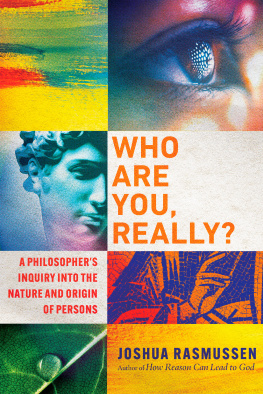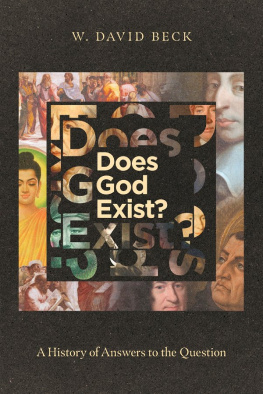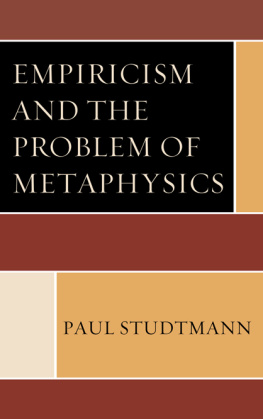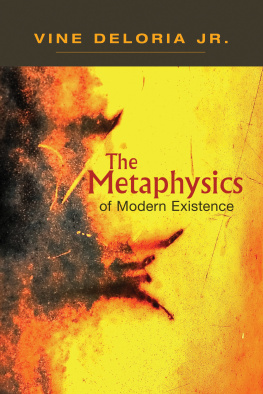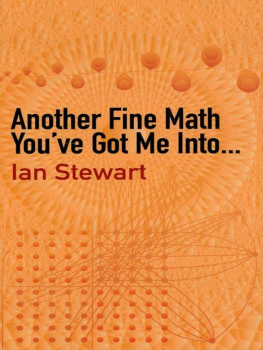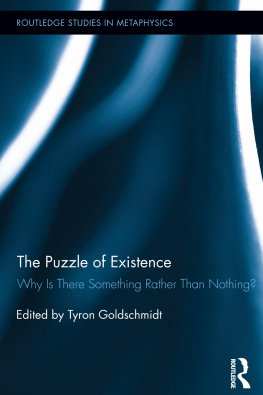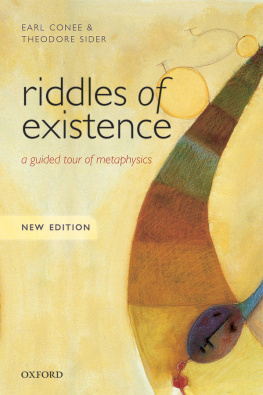Witherall - The Problem of Existence
Here you can read online Witherall - The Problem of Existence full text of the book (entire story) in english for free. Download pdf and epub, get meaning, cover and reviews about this ebook. City: Abingdon;Oxon, year: 2016, publisher: Taylor & Francis (CAM);Routledge, genre: Religion. Description of the work, (preface) as well as reviews are available. Best literature library LitArk.com created for fans of good reading and offers a wide selection of genres:
Romance novel
Science fiction
Adventure
Detective
Science
History
Home and family
Prose
Art
Politics
Computer
Non-fiction
Religion
Business
Children
Humor
Choose a favorite category and find really read worthwhile books. Enjoy immersion in the world of imagination, feel the emotions of the characters or learn something new for yourself, make an fascinating discovery.
The Problem of Existence: summary, description and annotation
We offer to read an annotation, description, summary or preface (depends on what the author of the book "The Problem of Existence" wrote himself). If you haven't found the necessary information about the book — write in the comments, we will try to find it.
The Problem of Existence — read online for free the complete book (whole text) full work
Below is the text of the book, divided by pages. System saving the place of the last page read, allows you to conveniently read the book "The Problem of Existence" online for free, without having to search again every time where you left off. Put a bookmark, and you can go to the page where you finished reading at any time.
Font size:
Interval:
Bookmark:

This book explores the question of why there is something instead of nothing. Several responses to this question are possible, but only some of them address the question seriously, respecting its emotional aspects as well as its cognitive dimension. The author carefully distinguishes those answers that are truly satisfactory, in both respects, from those that are inadequate. It can be argued that the existence of the world has no explanation at all, or that there is a necessary being whose existence is self-explanatory, or that the world exists because it has value. Each kind of response is defensible to some degree, and it is argued that where they are defensible, they have a common content. Incorporating aspects of both the 'analytical' and 'continental' traditions, this book also responds to several historical philosophers concerned with these questions, including Plato, Leibniz, Kant and Nietzsche.
ASHGATE NEW CRITICAL THINKING IN PHILOSOPHY
The Ashgate New Critical Thinking in Philosophy series aims to bring high quality research monograph publishing back into focus for authors, the international library market, and student, academic and research readers. Headed by an international editorial advisory board of acclaimed scholars from across the philosophical spectrum, this new monograph series presents cutting-edge research from established as well as exciting new authors in the field; spans the breadth of philosophy and related disciplinary and interdisciplinary perspectives; and takes contemporary philosophical research into new directions and debate.
Series Editorial Board:
David Cooper, University of Durham, UK
Peter Lipton, University of Cambridge, UK
Sean Sayers, University of Kent at Canterbury, UK
Simon Critchley, University of Essex, UK
Simon Glendinning, University of Reading, UK
Paul Helm, King's College London, UK
David Lamb, University of Birmingham, UK
John Post, Vanderbilt University, Nashville, USA
Alan Goldman, University of Miami, Florida, USA
Joseph Friggieri, University of Malta, Malta
Graham Priest, University of Queensland, Brisbane, Australia
Moira Gatens, University of Sydney, Australia
Alan Musgrave, University of Otago, New Zealand
Arthur Witherall
Australian National University, Australia

First published 2002 by Ashgate Publishing
Published 2016 by Routledge
2 Park Square, Milton Park, Abingdon, Oxon OX14 4RN
711 Third Avenue, New York, NY 10017, USA
Routledge is an imprint of the Taylor & Francis Group, an informa business
Copyright Arthur Witherall 2002
Arthur Witherall has asserted his moral right under the Copyright, Designs and Patents Act 1998 to be identified as the author of this work.
All rights reserved. No part of this book may be reprinted or reproduced or utilised in any form or by any electronic, mechanical, or other means, now known or hereafter invented, including photocopying and recording, or in any information storage or retrieval system, without permission in writing from the publishers.
Notice:
Product or corporate names may be trademarks or registered trademarks, and are used only for identification and explanation without intent to infringe.
British Library Cataloguing in Publication Data
Witherall, Arthur
The problem of existence. - (Ashgate new critical thinking in philosophy)
1.Ontology
I. Title
111.1
Library of Congress Cataloging-in-Publication Data
Witherall, Arthur, 1966
The problem of existence / Arthur Witherall.
p. cm. -- (Ashgate new critical thinking in philosophy)
Includes bibliographical references.
ISBN 0-7546-0858-1
1. Ontology. I. Title. II. Series.
BD331 .W58 2002
111'.1--dc21
2002103822
ISBN 13: 978-0-7546-0858-5 (hbk)
For Sasha, with love
The Fundamental Question of Metaphysics
In this book I shall investigate the question: 'Why is there something instead of nothing?' It is an extraordinary question, rarely asked and rarely answered. It does not easily arise in conversation, for it cannot be openly and cheerfully debated. Instead it appears as a kind of phantom, shrouded in mist and darkness. The question itself, even in the context of a philosophy classroom, has a strange and disquieting atmosphere. It seems to come from the void, and it depends upon the dreadful contrast between being and nothingness, raising the possibility of knowing both. In asking us to reflect upon this contrast, this question lies at the extreme end of philosophical inquiry, and it deserves to be recognized as such. Transcending all of the normal conceptual structures and standards, asking for an explanation beyond any explanatory framework, it seems both inescapable and incalculable.
Yet I will provide an answer to it of a certain kind, through a gradual process involving an investigation of many possible responses. The final result of this process will be represented not as a simple proposition with a distinct information content, but as a general schema which may be instantiated by a variety of explanatory propositions. As such, my answer will not entirely form a closure of the inquiry that is opened up, but I believe that it forms a coherent and complete response, in at least the sense that the investigation has a distinct conclusion.
My attempt to provide an answer draws upon both the intellectual and emotional aspects of human thought. I will assume that any response to a philosophical question, whether it proves to be intelligible or not, is generated within a particular context, and normally has both a conceptual background and an emotional environment. Most simple questions, arising in science and ordinary life, do not have any serious connection with emotions. This is because the context in which they are asked provides a conceptual background that determines the method of investigation and the content of the possible answers. However, in constructive philosophy, because we deal with extremities such as the basis of moral value, the existence of God, and the nature of reality as a whole, the context is normally far too open-ended to provide such details. Thus it is often the case that we cannot understand our answers to philosophical questions in their entirety without understanding the motives and feelings that have occasioned them. This does not mean that rationality is or ought to be excluded from philosophy. It means only that our responses to philosophical questions are often without a background method which supplies a unique answer through a determinate process, and we must therefore draw upon the resources of human nature as a whole. Since human nature encompasses much more than reason, many philosophical investigations have an emotional basis.
The range of feelings that may be appropriately occasioned by sincerely asking why anything exists is relatively narrow. If the question is interpreted properly, then it is clearly concerned with the fact of existence. This is the fact that there exists something rather than nothing, and the feelings we have about this fact are prompted in part by the nature of our 'encounter with (possible) nothingness'. Such an encounter can be dark and harrowing, or it can be light, creative, and humorous. But whether or not it is uplifting, a confrontation with Nothingness, or with Being itself, inevitably evokes extreme reactions because they represent the extreme limits of thought. As such, the feelings upon which responses may be based will mostly lie in the region of such passions as awe, astonishment, amazement, gratitude, joy, and exultation. These feelings may be called 'positive appreciations' because they are responses to a positive encounter with the fact of existence. We feel these ways when we rise up to meet this fact in some way, rather than shrinking from it or regarding it as oppressive.
Font size:
Interval:
Bookmark:
Similar books «The Problem of Existence»
Look at similar books to The Problem of Existence. We have selected literature similar in name and meaning in the hope of providing readers with more options to find new, interesting, not yet read works.
Discussion, reviews of the book The Problem of Existence and just readers' own opinions. Leave your comments, write what you think about the work, its meaning or the main characters. Specify what exactly you liked and what you didn't like, and why you think so.

